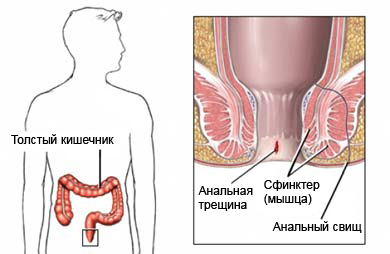Sphincterotomy – Anal sphincterotomy
Description sphincterotomy
Sphincterotomy – The procedure for treatment of anal fissures. Anal fissure – painful tear in the lining of the anus. Anus – opening, through which stool leaves of bodies. Gaps are usually found only in the area of the anus.

Reasons for sphincterotomy
Spasms of the muscles in the rectum may interfere with the healing of cracks. Sphincterotomy facilitates these spasms. Anal fissures heal faster if the following recommendations:
- A diet high in fiber;
- Drinking large amounts of fluid;
- Use of laxatives;
- Receiving warm baths;
- The use of recommended medications and ointments (outwardly);
Sphincterotomy can be done, when these funds do not help. The operation allows you to reduce the pain and spasms, accelerates healing of fractures. The pain will begin to decline within a few days.
Possible complications of sphincterotomy
Complications are rare, However, if you plan to do sphincterotomy, You need to know, they may include:
- Flatulence or fecal incontinence;
- Adverse reaction to anesthesia (dizziness, lowering blood pressure, breathlessness);
- Infection;
- Bleeding;
- Abscess or fistula.
Factors, that may increase the risk of complications include:
- Smoking.
How is anal sphincterotomy?
Preparation for the procedure
Before the surgery, the doctor may do the following tests, to determine the degree of crack:
- Physical examination;
- Rectal examination – the doctor inserts a gloved finger, greased with lubricant, into the anus and feels for cracks or swelling.
- Anoscopy – a special tool is inserted into the anus, to allow the doctor to examine the anal canal.
A few days before the operation, it is desirable to start the bowel clean.
The day before the operation must be:
- Serving breakfast and lunch, a light meal;
- After dinner, drink only clear liquids, such as water, broth, juices without pulp, fruit icecream;
- Do not eat or drink anything after midnight the day of surgery;
- You can also put an enema, to help clean the intestines.
It may be necessary to adjust the dose or stop taking certain drugs, such as:
- Aspirin and other nonsteroidal anti-inflammatory drugs (eg, Ibuprofen, naproxen)
- Blood-thinning drugs, such as warfarin;
- Antiplatelet drugs, such as clopidogrel.
Anesthesia
Depending on the condition of the patient, may apply one of the following types of anesthesia:
- The operation is performed under general anesthesia, during the operation the patient is asleep;
- Local anesthesia – analgesia particular area or portion of the body.
Procedure sphincterotomy
Around anal fissure carefully removed all the skin. Further, the doctor makes an incision in the anal sphincter. This allows you to relax the sphincter and allows it to stretch, reducing the load on the crack. The doctor places a sterile bandage to the anus, to stop the bleeding.
Duration of operation
The operation lasts less than one hour.
Will it hurt?
Anesthesia will prevent pain during surgery. For pain relief after surgery appoint appropriate painkillers.
Postoperative care
In the hospital
In the House are given painkillers and made dressings, avoid bleeding.
Home Care
Houses need to fulfill the following recommendations, to ensure the normal postoperative recovery:
- Keep the rectal area clean:
- Remove the bandage before stool;
- Take sitz bath 3-4 twice a day and after each bowel movement. Sitz baths will help relieve discomfort and clean the anal area. For a sit-bath to sit in warm water for 10-15 minutes. After the bath do not need to wipe or rub the anus;
- After operation, within a few days, after a bowel movement is necessary to use wet wipes, instead of toilet paper;
- Within a week or more from the rectum will go a reddish-yellow discharge. During this period it is necessary to use sanitary pads, to absorb secretions. After physical activity or bowel movements can activate selections;
- When receiving anesthetic drugs, perhaps, will have to take a laxative to prevent constipation. Eating high-fiber foods can also help to facilitate the passage of stool;
- Sit or stand preferably not more than one hour after the lifting of the bed;
- During the first six weeks after surgery, You can not lift anything heavier 5 kg.
It is necessary to go to the hospital in the following cases:
- Heavy bleeding from the rectum;
- Fever;
- Foul-smelling discharge from the rectum;
- Excessive swelling in the rectal area;
- No power to control bowel movements;
- Difficulty urinating.
